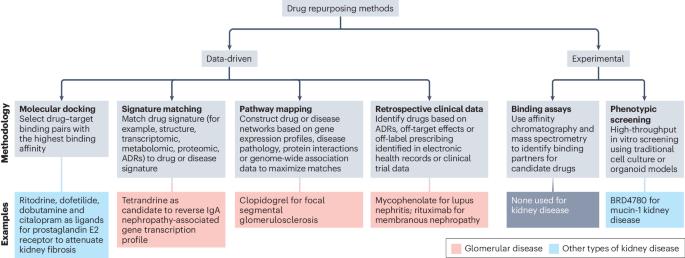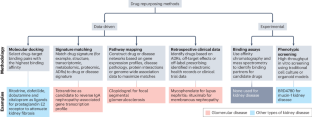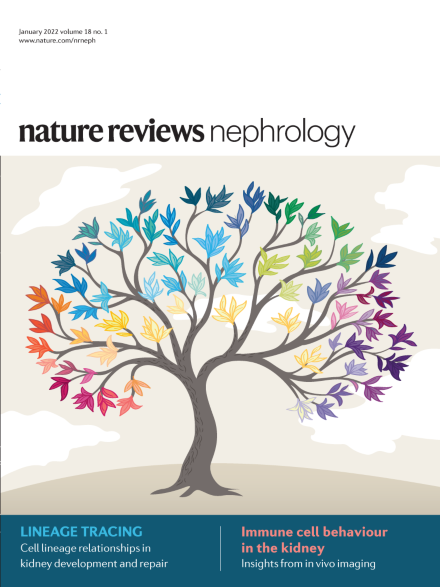Drug repurposing for glomerular diseases: an underutilized resource
IF 28.6
1区 医学
Q1 UROLOGY & NEPHROLOGY
引用次数: 0
Abstract
Drug repurposing in glomerular disease can deliver opportunities for steroid-free regimens, enable personalized multi-target options for resistant or relapsing disease and enhance treatment options for understudied populations (for example, children) and in resource-limited settings. Identification of drug-repurposing candidates can be data driven, which utilizes existing data on disease pathobiology, drug features and clinical outcomes, or experimental, which involves high-throughput drug screens. Information from databases of approved drugs, clinical trials and PubMed registries suggests that at least 96 drugs on the market cover 49 targets with immunosuppressive potential that could be candidates for drug repurposing in glomerular disease. Furthermore, evidence to support drug repurposing is available for 191 immune drug target–glomerular disease pairs. Non-immunological drug repurposing includes strategies to reduce haemodynamic overload, podocyte injury and kidney fibrosis. Recommended strategies to expand drug-repurposing capacity in glomerular disease include enriching drug databases with glomeruli-specific information, enhancing the accessibility of primary clinical trial data, biomarker discovery to improve participant selection into clinical trials and improve surrogate outcomes and initiatives to reduce patent, regulatory and organizational hurdles. Drug repurposing could expand the therapeutic options available to patients with glomerular disease. Here, the authors examine different approaches to the identification of drug candidates, consider current immunosuppressive and non-immunological options and discuss strategies to maximize drug repurposing in glomerular disease.


肾小球疾病的药物再利用:未充分利用的资源
肾小球疾病的药物再利用可以为无类固醇疗法提供机会,为耐药或复发疾病提供个性化的多靶点选择,并为研究不足的人群(如儿童)和资源有限的环境提供更多的治疗选择。候选药物再用途的确定可以是数据驱动型的,即利用现有的疾病病理生物学、药物特征和临床结果数据;也可以是实验型的,即进行高通量药物筛选。从已批准药物数据库、临床试验和 PubMed 登记处获得的信息表明,市场上至少有 96 种药物涵盖 49 个具有免疫抑制潜力的靶点,这些靶点可作为肾小球疾病的候选药物再利用。此外,191 种免疫药物靶点与肾小球疾病的配对也有证据支持药物再利用。非免疫性药物再利用包括减轻血流动力学超负荷、荚膜细胞损伤和肾脏纤维化的策略。扩大肾小球疾病药物再利用能力的建议策略包括:用肾小球特异性信息丰富药物数据库、提高原始临床试验数据的可及性、发现生物标志物以改进临床试验参与者的选择并改善替代结果,以及减少专利、监管和组织障碍的举措。
本文章由计算机程序翻译,如有差异,请以英文原文为准。
求助全文
约1分钟内获得全文
求助全文
来源期刊

Nature Reviews Nephrology
医学-泌尿学与肾脏学
CiteScore
39.00
自引率
1.20%
发文量
127
审稿时长
6-12 weeks
期刊介绍:
Nature Reviews Nephrology aims to be the premier source of reviews and commentaries for the scientific communities it serves.
It strives to publish authoritative, accessible articles.
Articles are enhanced with clearly understandable figures, tables, and other display items.
Nature Reviews Nephrology publishes Research Highlights, News & Views, Comments, Reviews, Perspectives, and Consensus Statements.
The content is relevant to nephrologists and basic science researchers.
The broad scope of the journal ensures that the work reaches the widest possible audience.
 求助内容:
求助内容: 应助结果提醒方式:
应助结果提醒方式:


